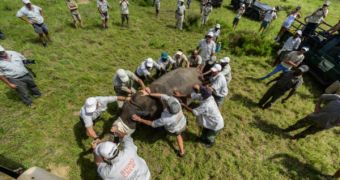Conservationists looking after South Africa's rhino population have recently decided to capture six white rhinos and relocate them to Botswana.
The decision to send these animals to live in Botswana's Okavango Delta was taken shortly after conservationists realized that poaching in South Africa was running rampant, and that their best option was moving the animals to a safer location.
Just a few days back, a group of poachers were arrested for snooping around the Phinda Private Game Reserve in South Africa, Mongabay reports.
Since wildlife rangers in Botswana are better equipped to deal with such incidents, it's no wonder that conservationists did not delay in relocating the six white rhinos.
&Beyond, the organization whose members are in charge of keeping these rhinos alive, issued the following statement:
“Botswana has a strong security and monitoring framework in place whereby the Department of Wildlife Anti-Poaching Unit and the Botswana Defence Force help to protect the species," the tour company writes.
“All six rhino have been collared and microchipped for research and monitoring purposes and they will be tracked daily by our research team. The information gathered will help guide and secure future translocations,” &Beyond adds.
While checking to see how healthy the white rhinos were, conservationists discovered that one of the females was pregnant.
People visiting Botswana's Okavango Delta might catch a glimpse of these animals while visiting the area together with &Beyond guides.
“Guests visiting our lodges in the Okavango Delta will also be able to enjoy guided nature walks with our expert guides to view these endangered animals in their new home,” the organization points out.
The six white rhinos will enjoy round-the-clock protection, &Beyond promises.
White rhinos are now considered to be a vulnerable species, conservationists explain. More precisely, reports indicate that about 20,000 are left in their natural habitats, and that 90% live in South Africa.

 14 DAY TRIAL //
14 DAY TRIAL //